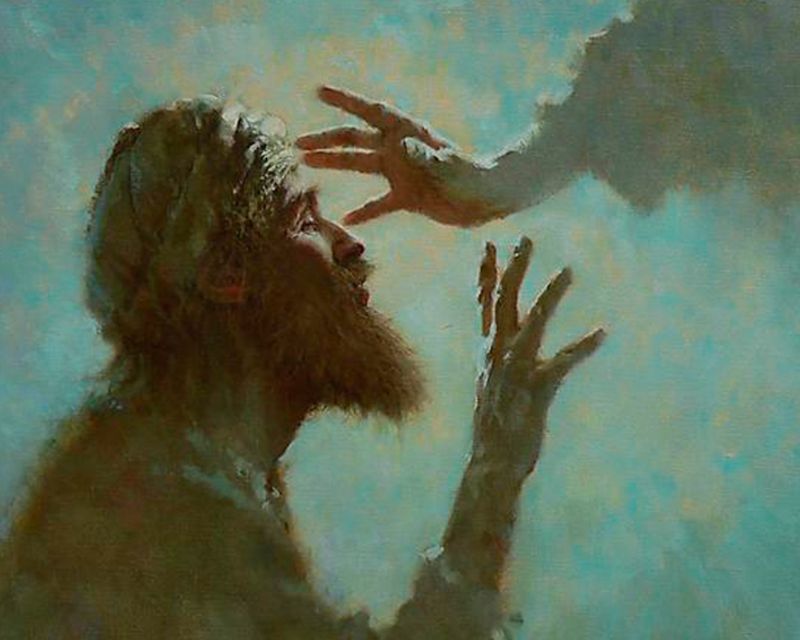Then their eyes were opened, and they recognized him, and he disappeared from their sight. (Lk 24:31)
The Evangelist Luke constructs the Emmaus pericope as a prototypical narrative of the encounter of Jesus’ disciples with the Risen Christ. The disciples, who had followed the Nazarene itinerant preacher, healer and miracle worker—a “prophet” whom they believed to be the Messiah promised to Israel
(Lk 24:19, 21)—were devastated, disillusioned and afraid after the shock of his sudden crucifixion. Like Peter himself, who went back to his business after their Teacher’s execution (see Jn 21:1‑3), they also left Jerusalem. They seemed oblivious to the women’s testimony and to the empty tomb (see
Lk 24:22‑24). They not only hoped to pick up the pieces of their lives, but, more likely, to save their own skin. In their belief that the Lord was dead, the community itself was breaking: each fending for themselves; each doing their own thing and going their own way. Only in Christ could they be one.
On their journey away from Jerusalem, the Risen Christ seeks them and walks all the way with them. He even explains to them the Scriptures about himself (see Lk 24:27), as he had done many times before.

But they failed to recognise him. Their eyes remained blinded; their faith indifferent.
It took one slight gesture of kindness and hospitality towards the stranger (see Lk 24:29)—one gesture that broke through their self‑referentiality—for the Risen Christ to reveal himself to them.
It takes but one seemingly insignificant sign of our willingness to see him, for Christ to open our eyes. But as “their eyes were opened and they recognised him,” they could only bear to witness his glory for just one fleeting moment. “He disappeared from their sight” (Lk 24:31). The light of his transfigured presence was too much to bear until they would be perfected by receiving and embodying the Holy Spirit as the ecclesia, the “Holy People of God.”
That one moment of encounter with the Risen Christ was enough to transform the disoriented disciples walking to Emmaus into true “missionary disciples” (Evangelii gaudium, 24, 119‑121, 173) and the seed of the ecclesia.
- They are emboldened to return to Jerusalem there and then (see Lk 24:33);
- they receive the Holy Spirit from Christ himself who reappears to the group reunited in the Holy City (see Lk 24:36);
- they witness his ascension (see Lk 24:51).
- In response, as the remnant of Israel, they worship at the temple in Thanksgiving (see Lk 24:53).
- Thus, they anticipate the Last Days that, as Luke recalls from the Prophet Joel, are inaugurated in the descent of the Holy Spirit on all flesh (Acts 2:17).
The disciples who had followed Jesus, but were lost and afraid at his death, become the first “body of Christ” witnessing the joy of his salvation to the world. They not only proclaim the Good News to the desolate, but, in the power that descends upon them, they heal the sick, raise the lowly, forgive sins and build communities of friends where there are “no longer Jew or Greek, … no longer slave or free, … no longer male and female; for all of you are one in Christ Jesus” (Gal 3:28). As Jesus had promised them: “Very truly, I tell you, the one who believes in me will also do the works that I do and, in fact, will do greater works than these… If in my name you ask me for anything, I will do it” (Jn 14:12‑14).

The miraculous gifts of the Spirit bestowed on the chosen ones—“To each is given the manifestation of the Spirit for the common good: to one is given through the Spirit the utterance of wisdom, and to another the utterance of knowledge according to the same Spirit, to another faith by the same Spirit, to another gifts of healing by the one Spirit, to another the working of miracles, to another prophecy, to another the discernment of spirits, to another various kinds of tongues, to another the interpretation of tongues” (1 Cor 12: 7‑10)—spread like wildfire as the Church takes root all‑over the known world… including on our own island.


